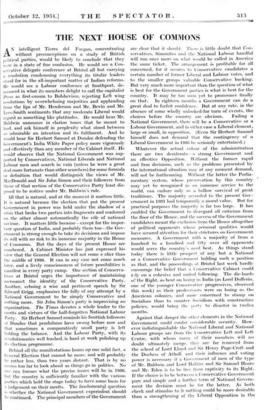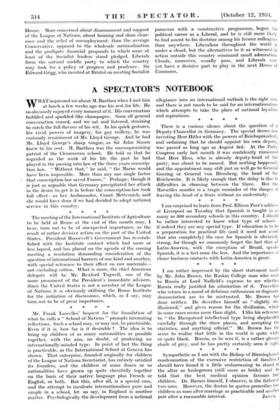THE NEXT HOUSE OF COMMONS A N intelligent Tierra del Fuegan,
concentrating without preconceptions on a study of British political parties,. would be likely to conclude that they were in a state of fine confusion. He would see a Con- servative delegate conference at Bristol all but carrying a resolution condemning everything its titulitr leaders stood for in the all-important matter of Indian reforms. Re would see a Labour conference at Southport, de- nounced in what its members delight to call the capitalist Press as first-cousin to Bolshevism, rejecting Left wing resolutions by overwhelming majorities and applauding from the lips of Mr. Henderson and Mr. Bevin and Mr. Lees-Smith sentiments that any moderate Liberal would regard as something. like platitudes. He would hear Mr. Baldwin announce in clarion tones that he meant to lead, and ask himself in perplexity what stood between so admirable an intention and its fulfilment. And he would hear Sir Herbert Samuel at Dundee defending the Government's India White Paper policy more vigorously and effectively than any member of the Cabinet itself. He would observe thdt the National Government was sup- ported by Conservatives, National Liberals and National Labour men and search in vain (unless he were a great deal more fortunate than other searchers) for some formula or definition that would distinguish the views of Mr. MacDonald and Sir John Simon and their followers from those of that section of the Conservative Party least dis- posed to be restive under Mr. Baldwin's rule.
All that is natural, and at the moment it matters little. It is natural because the election that put the present Government in power was held under the shadow of a crisis that broke two parties into fragments and conferred on the other almost automatically the role of national saviour. It matters little because—except for the impor- tant question of India, and probably there too—the Gov- ernment is strong enough to take its decisions and impose its will with no risk to its immense majority in the House of Commons. But the days of the present House are numbered. A Cabinet Minister has just expressed his view that the General Election will not come e irlier than the middle of 1936. It can in any case not come much later, and a lively consciousness of future possibilities is manifest in every party camp. One section of Conserva- tives at Bristol urges the importance of maintaining sacrosanct the identity of the Conservative Party. Another, echoing a wise and pertinent speech by Sir Edward Grigg, emphasizes the folly of any attempt by a National Government to be simply Conservative and nothing more. Sir John Simon's party is improvising an Organization. The Times devotes a whole leader to the merits and virtues of the half-forgotten National Labour Party. Sir Herbert Samuel reminds his Scottish followers at Dundee that pendulums have swung before now and that sometimes a comparatively small party is left holding the balance. And the Labour Party, with its revolutionaries well leashed, is hard at work polishing up its election programme.
Behind all the manifestations looms up one solid fact, a General Election that cannot be more, and will probably be rather less, than two years distant. That is by no means too far to look ahead as things go in politics. No One can foresee what the precise issues will be in 1936, but the country is sufficiently familiar with the various parties which hold the stage today to have some basis for a judgement on their merits. The fundamental question Is whether the National Government experiment should be continued. The principal members of the Government are clear that it should. There is little doubt that Con- servatives, Simonites and the National Labour handful will run once more on what would be called in America the same ticket. The arrangement is profitable for all concerned, for it secures to Conservative candidates a certain number of former Liberal and Labour vOtes, and to the smaller groups valuable Conservative backing. But very much more important than the question of what is best for the Government parties is what is best for the country. It may be too soon vet to pronounce finally on that. In eighteen months a Government can do a great deal to forfeit confidence. But at any rate, in the absence of some wholly unlooked-for turn of events, the choices before the country are obvious. Failing a National Government, there will be .a Conservative or a Labour Government, and in either case a Liberal element, large or small, in opposition. (Even Sir Herbert Samuel himself does not demand that the contingency of a Liberal Government in 1936 be seriously entertained.) • Whatever the actual colour of the administration there are two desiderata—a strong Government and an effective Opposition. Without the former rapid and firm decisions, such as the problems presented by the international situation may at any moment demand, will not, be forthcoming. Without the latter the Parlia- mentary system, whose preservation by this country may yet be recognized as an immense service to the world, can endure only as a hollow survival of great traditions. The majority accorded to the present Gov- ernment in 1931 had temporarily a moral value. But for practical purposes the majority is far too large. It has enabled the Government to disregard all criticism from the floor of the House, and the success of the Government candidates meant the exclusion from the House altogether 'of political opponents whose personal qualities would, have secured attention for their strictures on Government measures. A Government with a majority of from mi hundred to a hundred and fifty over all opponents would serve the country's need best. As things stand today the-re is little prospect of any but a National or a Conservative Government holding such a position as that, and the proceedings at Bristol last week hardly encourage the belief that a Conservative Cabinet could r 21y on a cohesive and united following. The die-hards of the Right, as bent on losing us India (as Lord Dufferin, one of the younger Conservative progressives, observed this week) as their predecessors were on losing us the American colonies, and more concerned to stamp on Socialism than to counter Socialism with constructive policies, would brim: the party to disaster in twelve months.
Against that danger the other elements in the National Government could confer considerable security. How- ever indistinguishable the National Liberal and National Labour groups are from the Conservative Left and Left Centre, with whom many of their members will no doubt ultimately merge. they are far removed from the school of Lord Lloyd and Sir Henry. Page-Croft and the Duchess of Atholl, and their influence and voting power is necessary if a Government of men of the type of Mr. Baldwin and Lord Halifax and Sir Samuel Hoare and Mr. Eden is to be free from captivity to its Right. If the choice is to be between a Conservative Government pure and simple and a further term of National Govern- ment the decision must be for the latter. As both check and stimulus to it nothing could be more desirable than a strengthening of the Liberal Opposition in the House. More concerned about disarmament and support of the League of Nations, about housing and slum clear- ance and the relief of unemployment, than the average Conservative, opposed to the wholesale nationalization and the profligate financial proposals to which some at least of the Socialist leaders stand pledged, Liberals form the natural middle party to which the country may look for a policy of progress and prudence. Sir Edward Grigg, who insisted at Bristol on meeting Socialist panaceas with a constructive programme, began his political career as a:Liberal, and he is still more likely to find assent to his doctrine among his former colleagues than anywhere. Liberalism throughout the world is under a cloud, but the alternatives to it as witnessed in action outside this country command small admiration. Clouds, moreover, usually pass, and Liberals may yet have a decisive part to play in the next House of Commons.















































 Previous page
Previous page